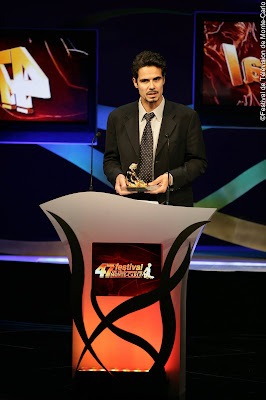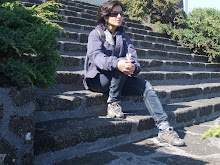Paul Moreira in Monte Carlo in 2007 receiving an award for his documentary on Iraq - "Agony of a Nation".
Introduction:
680. That was the number that set investigative journalist Paul Moreira on the road to Kabul. At the 2008 Donors Conference in Paris, USAID made the claim that they had built 680 schools in Afghanistan. But it didn’t sound like the truth to Paul Moreira and he decided to check it out himself.
Moreira’s documentary, ‘Afghanistan: On the Dollar Trail’ is the result of his investigation into whether these schools were ever built. The film also contrasts the misery of ordinary Afghans, with the corrupt political class when Moreira stumbles upon the Walt Disney end of Kabul where people are building Cinderella-castle style homes.
Paul Moreira has built a career out of his investigative skills. In 1999 he launched an investigative show on Canal Plus TV and in 2006 he set up his own TV company - Premières Lignes based in Paris. His first investigative documentary about Iraq, ‘Agony of a Nation’, was awarded ‘Best Documentary’ at Festival International de Télévision de Monte-Carlo’ and ‘Best Investigative Documentary’ at Festival International du Grand Reportage d’Actualité.’
I interviewed him via email.
Q1.Paris in 2008 where nearly 21 billion USD was pledged to rebuild Afghanistan
I did not know exactly if I would use anything from the Donors conference in Paris
There were 300 journalists, all separated from the conference by a security apparatus and a wall. We were all following the conference on an internal TV network. Every one was there, agencies, TVs, papers... frustrated! No access. Then Hamid Karzai (Afghan President) and Bernard Kouchner (Foreign Minister of France) came out to announce a new injection of funds in the Aga Khan Hospital in Kabul (by the way, one of the only donor created institutions that works fine...). After the announcement, all the journalists were literally rushing towards Karzai, asking the question every one wanted to ask -Corruption, where is the money going? I remember Karzai was elbowing his way back to the other side of the wall. Due to the crowd of reporters around him he couldn’t and had to answer some of these questions before security guys reset a safety zone between him and the press.
Then there was the communication of USAID. The man responsible for Afghanistan
You can read the entire interview on the International Affairs Review website where it was published on 28th March 2010.

